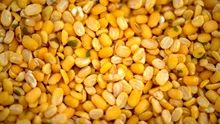
In recent years, India has seen significant growth in its plant-based food industry, aligning with its historical embrace of principles like non-violence, vegetarianism, and vegan cuisine. The concept of plant-centric eating has deep roots in Indian culture, and this sector is now poised for substantial expansion, with projections indicating robust growth by 2030. Globally, there is a notable shift towards plant-based foods, driven by consumer awareness of environmental and health impacts.
The global vegan food industry is expected to grow steadily between 2022 and 2027, with a compound annual growth rate of 11.32%. In particular, the plant-based dairy sector is set to expand significantly, from US$ 21 million to US$ 63.9 million by 2024, with an impressive compound annual growth rate of 20.7%. India's substantial vegetarian population, making up about 30% of its people, and growing recognition of the health and environmental benefits of plant-based diets, are contributing to the country's plant-based food market's projected 11.8% compound annual growth rate between 2021 and 2028.
Rising Demand For Vegan Food In India
Plant-based foods are products made entirely from plant-derived ingredients, free from any animal components, and serve as substitutes for traditional animal-based items. The production of animal-based products has substantial negative environmental impacts, including land conversion, resource consumption, and adverse effects on communities and ecosystems. Plant-based diets offer a sustainable solution, addressing ethical concerns, animal welfare, and unsustainable agricultural practices.
The demand for vegan snacks and sweets is propelling India's vegan industry, with the sector potentially constituting 7.7% of the global protein market by 2030, valued at US$ 162 billion. In contrast, global animal and dairy protein demand is forecasted to reach US$ 1.2 trillion by 2030. The plant-based dairy market is expected to grow rapidly, from US$ 21 million to US$ 63.9 million, with an impressive compound annual growth rate of 20.7%.
India's plant-based food sector is witnessing substantial growth, with numerous startups and FMCG companies entering the market, offering alternatives to traditional animal-based products. This expansion not only presents business opportunities but also has the potential to improve farmers' incomes and address food scarcity, climate change, and public health issues. India's diverse crop production, advanced food industry, research institutions, R&D achievements, and growing private equity sector make it a promising hub for further expansion in the plant-based food industry.
Market Segmentation For Plant-Based Foods In India
Plant-Based Meat
India has witnessed a growing interest in plant-based meat products, including innovative alternatives like sausages, burgers, and kebabs made from ingredients like soy, pea protein, and mushrooms. Projections indicate that the plant-based meat market in India, currently valued at US$ 30-40 million, is set for substantial growth, with estimates reaching US$ 500 million in the near future.
Different Categories of Plant-Based Meat Alternatives
-
Soy-based meat alternatives: These encompass soybean-derived products like tofu, tempeh, kebabs, chaaps, and textured vegetable protein.
-
Pea protein-based products: This category includes burgers, sausages, and other meat substitutes made from pea protein.
-
Mushroom-based products: This category features mushroom-based burgers and sausages, known for their meat-like texture and flavor, making them a popular alternative.
-
Legume-based products: Within this category, you'll find meat substitutes produced from legumes such as lentils, chickpeas, and black beans.
-
Jackfruit-based products: In India, jackfruit serves as a widely used alternative meat source, finding its way into items like burgers, biryanis, and tacos.
Plant-Based Seafood
While substitutes for beef and chicken are expected to lead in sales, there remains a significant market demand for plant-based seafood, with an estimated compound annual growth rate (CAGR) of 31.3% anticipated from 2022 to 2032.
Plant-based Dairy Products
Among plant-based categories, plant-based milk is the most mature, boasting a market value of US$ 2.6 billion. Plant-based milk alone makes up 36% of the entire global plant-based food industry. The anticipated value of the plant-based milk industry is expected to fall within the range of US$ 59-244 million (equivalent to Rs. 459-1,889 crore).
Government Initiatives For India's Vegan Businesses
Pradhan Mantri Kisan Sampada Yojana (PMKSY)
The Pradhan Mantri Kisan SAMPADA (Scheme for Agro-Marine Processing and Development of Agro-Processing Clusters) Yojana, a centrally sponsored scheme, has been allocated a budget of US$ 731.40 million (equivalent to Rs. 6,000 crore) for the period spanning from 2016 to 2020. This initiative represents a comprehensive package aimed at establishing modern infrastructure and improving the efficiency of supply chain management, starting from the farm gate and extending to retail outlets. Its primary objective is to stimulate growth in India's food processing sector, leading to increased income for farmers, generating substantial employment opportunities, particularly in rural areas, reducing agricultural waste, elevating processing levels, and boosting the export of processed foods. The following schemes will be executed under the PM Kisan SAMPADA Yojana:
-
Comprehensive Cold Chain and Value Enhancement Infrastructure
-
Large-Scale Food Centers
-
Establishing or Increasing Food Processing and Preservation Capacities (Unit Program)
-
Infrastructure for Agricultural Processing Clusters
-
Establishing Connections Both Upstream and Downstream
-
Infrastructure for Ensuring Food Safety and Quality
-
Developing Human Resources and Institutions
PM Formalisation of Micro Food Processing Enterprises Scheme
The Pradhan Mantri Formalisation of Micro food processing Enterprises (PMFME) Scheme, launched under the Aatma Nirbhar Bharat Abhiyaan in June 2020, is currently operational in 35 states and union territories in India. Its primary goal is to boost micro-enterprises in the informal food processing sector and bring them into the formal economy. The scheme provides financial support of US$ 487.61 (equivalent to Rs. 40,000) for working capital and small tools to each member of Self-Help Groups (SHGs) involved in food processing. So far, more than 1 lakh SHG members have been identified, and approximately US$ 24.74 million (Rs. 203 crore) has been disbursed for this purpose.
Production Linked Incentive Scheme for Food Processing Industry (PLISFPI)
The Production Linked Incentive Scheme for Food Processing Industry (PLISFPI) is a central sector initiative with a budget of US$ 1.32 billion (Rs. 10,900 crore) for 2021-22 to 2026-27. Its main goals are to support the growth of global food manufacturing leaders in India, utilizing the country's natural resources, and promote Indian food brands internationally. By 2026-27, the scheme aims to expand processing capacity, resulting in a processed food output valued at approximately US$ 4.07 billion (Rs. 33,494 crore) and the creation of around 2.5 lakh jobs.












